

Game theory. Game theory is the study of strategic decision making.
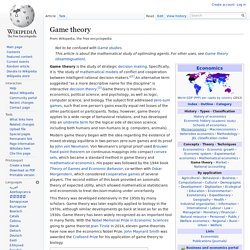
Specifically, it is "the study of mathematical models of conflict and cooperation between intelligent rational decision-makers. "[1] An alternative term suggested "as a more descriptive name for the discipline" is interactive decision theory.[2] Game theory is mainly used in economics, political science, and psychology, as well as logic, computer science, and biology. The subject first addressed zero-sum games, such that one person's gains exactly equal net losses of the other participant or participants. Today, however, game theory applies to a wide range of behavioral relations, and has developed into an umbrella term for the logical side of decision science, including both humans and non-humans (e.g. computers, animals).
Modern game theory began with the idea regarding the existence of mixed-strategy equilibria in two-person zero-sum games and its proof by John von Neumann. Sociocracy. Sociocracy is a system of governance, using consent-based decision making among equivalent individuals and an organizational structure based on cybernetic principles.[1] The most recent implementation of sociocracy by Gerard Endenburg,[2] also known as Circular Organizing, was developed as a new tool for governance of private enterprise, but has been adopted in many different kinds of organizations including public, private, non-profit and community organizations as well as professional associations.
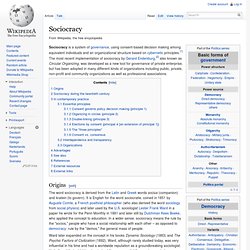
Origins[edit] The word sociocracy is derived from the Latin and Greek words socius (companion) and kratein (to govern). It is English for the word sociocratie, coined in 1851 by Auguste Comte, a French positivist philosopher (who also derived the word sociology from social physics) and later used by the U.S. sociologist Lester Frank Ward in a paper he wrote for the Penn Monthly in 1881 and later still by Dutchman Kees Boeke, who applied the concept to education.
Essential principles[edit] Open-source governance. Open-source governance is a political philosophy which advocates the application of the philosophies of the open source and open content movements to democratic principles in order to enable any interested citizen to add to the creation of policy, as with a wiki document.
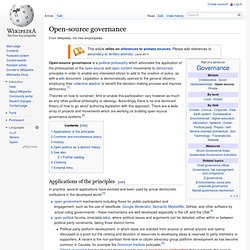
Legislation is democratically opened to the general citizenry, employing their collective wisdom to benefit the decision-making process and improve democracy.[1] Theories on how to constrain, limit or enable this participation vary however as much as any other political philosophy or ideology. Accordingly there is no one dominant theory of how to go about authoring legislation with this approach. There are a wide array of projects and movements which are working on building open-source governance systems.[2] Applications of the principles[edit] In practice, several applications have evolved and been used by actual democratic institutions in the developed world:[3] Common and simultaneous policy[edit]
Paradigm shift. A paradigm shift (or revolutionary science) is, according to Thomas Kuhn, in his influential book The Structure of Scientific Revolutions (1962), a change in the basic assumptions, or paradigms, within the ruling theory of science.
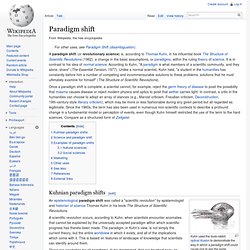
It is in contrast to his idea of normal science. Community engagement. This article is about grassroots community benefit efforts.
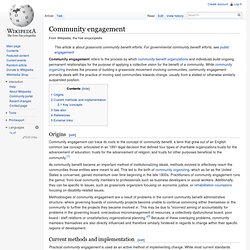
For governmental community benefit efforts, see public engagement Community engagement refers to the process by which community benefit organizations and individuals build ongoing, permanent relationships for the purpose of applying a collective vision for the benefit of a community. While community organizing involves the process of building a grassroots movement involving communities, community engagement primarily deals with the practice of moving said communities towards change, usually from a stalled or otherwise similarly suspended position. Origins[edit] Noocracy. Noocracy (/noʊˈɒkrəsi/ or /ˈnoʊ.əkrəsi/), or "aristocracy of the wise", as defined by Plato, is a social and political system that is "based on the priority of human mind", according to Vladimir Vernadsky.
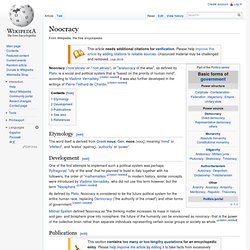
[citation needed] It was also further developed in the writings of Pierre Teilhard de Chardin. [citation needed] Etymology[edit] Development[edit] One of the first attempts to implement such a political system was perhaps Pythagoras' "city of the wise" that he planned to build in Italy together with his followers, the order of "mathematikoi. " Main Page - Metagovernment - Government of, by, and for all the people. Metasystem transition. A metasystem transition is the emergence, through evolution, of a higher level of organization or control.
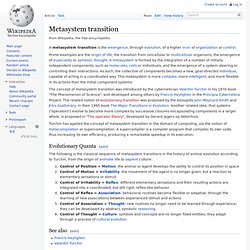
The concept of metasystem transition was introduced by the cybernetician Valentin Turchin in his 1970 book "The Phenomenon of Science", and developed among others by Francis Heylighen in the Principia Cybernetica Project. The related notion of evolutionary transition was proposed by the biologists John Maynard Smith and Eörs Szathmáry, in their 1995 book The Major Transitions in Evolution. Another related idea, that systems ("operators") evolve to become more complex by successive closures encapsulating components in a larger whole, is proposed in "The operator theory", developed by Gerard Jagers op Akkerhuis.